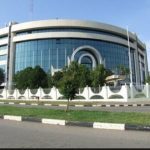An advocacy group has advised the federal government to provide adequate funding for the National Identity Management Commission, NIMC to overcome many of the nation’s challenges, including insecurity.
Citizens Advocacy for Social and Economic Rights says support is needed to gather data for economic planning and improved living conditions.
In Nigeria, inaccurate and unavailable data remains a concern for many citizens.
In most cases, the nation relies on data provided by foreign based organisations including the United Nations and World Bank.
The mandate of the National Identity Management Commission, established in 2007, is to establish and regulate a reliable and sustainable national system of Identity management.
To overcome the challenge of insecurity, the Goodluck Jonathan administration in 2014 launched the Nigerian National Identity Card.
It had a slow start as Nigerians began to enroll for the National Identity Number.
Although the government assured enrollees the registration takes less than 10 minutes, many citizens had to spend days of harrowing experiences to get their NIN.
Citizens also craved for a central identity portal that will guide against fraud and enhance true identity
In 2015, former President Muhammadu Buhari directed government agencies collecting demographic and biometric data of citizens and legal residents to aggregate their data into a single databank to be domiciled with and managed by NIMC.
Years after, the nation is still struggling to meet this target even as the introduction of technology seems to have lessened the stress in the enrolment process.
But the Citizens Advocacy for Social and Economic Rights believes NIMC can do more to make Nigeria more secured and lives more meaningful
It believes planning can only be effectively done with appropriate data.
And as the National Assembly puts finishing touches to the 2024 Appropriation Bill, this non governmental organisation canvasses for adequate funding of the agency for more efficiency
An advocacy group has advised the federal government to provide adequate funding for the National Identity Management Commission, NIMC to overcome many of the nation’s challenges, including insecurity.
Citizens Advocacy for Social and Economic Rights says support is needed to gather data for economic planning and improved living conditions.
In Nigeria, inaccurate and unavailable data remains a concern for many citizens.
In most cases, the nation relies on data provided by foreign based organisations including the United Nations and World Bank.
The mandate of the National Identity Management Commission, established in 2007, is to establish and regulate a reliable and sustainable national system of Identity management.
To overcome the challenge of insecurity, the Goodluck Jonathan administration in 2014 launched the Nigerian National Identity Card.
It had a slow start as Nigerians began to enroll for the National Identity Number.
Although the government assured enrollees the registration takes less than 10 minutes, many citizens had to spend days of harrowing experiences to get their NIN.
Citizens also craved for a central identity portal that will guide against fraud and enhance true identity
In 2015, former President Muhammadu Buhari directed government agencies collecting demographic and biometric data of citizens and legal residents to aggregate their data into a single databank to be domiciled with and managed by NIMC.
Years after, the nation is still struggling to meet this target even as the introduction of technology seems to have lessened the stress in the enrolment process.
But the Citizens Advocacy for Social and Economic Rights believes NIMC can do more to make Nigeria more secured and lives more meaningful
It believes planning can only be effectively done with appropriate data.
And as the National Assembly puts finishing touches to the 2024 Appropriation Bill, this non governmental organisation canvasses for adequate funding of the agency for more efficiency
An advocacy group has advised the federal government to provide adequate funding for the National Identity Management Commission, NIMC to overcome many of the nation’s challenges, including insecurity.
Citizens Advocacy for Social and Economic Rights says support is needed to gather data for economic planning and improved living conditions.
In Nigeria, inaccurate and unavailable data remains a concern for many citizens.
In most cases, the nation relies on data provided by foreign based organisations including the United Nations and World Bank.
The mandate of the National Identity Management Commission, established in 2007, is to establish and regulate a reliable and sustainable national system of Identity management.
To overcome the challenge of insecurity, the Goodluck Jonathan administration in 2014 launched the Nigerian National Identity Card.
It had a slow start as Nigerians began to enroll for the National Identity Number.
Although the government assured enrollees the registration takes less than 10 minutes, many citizens had to spend days of harrowing experiences to get their NIN.
Citizens also craved for a central identity portal that will guide against fraud and enhance true identity
In 2015, former President Muhammadu Buhari directed government agencies collecting demographic and biometric data of citizens and legal residents to aggregate their data into a single databank to be domiciled with and managed by NIMC.
Years after, the nation is still struggling to meet this target even as the introduction of technology seems to have lessened the stress in the enrolment process.
But the Citizens Advocacy for Social and Economic Rights believes NIMC can do more to make Nigeria more secured and lives more meaningful
It believes planning can only be effectively done with appropriate data.
And as the National Assembly puts finishing touches to the 2024 Appropriation Bill, this non governmental organisation canvasses for adequate funding of the agency for more efficiency
An advocacy group has advised the federal government to provide adequate funding for the National Identity Management Commission, NIMC to overcome many of the nation’s challenges, including insecurity.
Citizens Advocacy for Social and Economic Rights says support is needed to gather data for economic planning and improved living conditions.
In Nigeria, inaccurate and unavailable data remains a concern for many citizens.
In most cases, the nation relies on data provided by foreign based organisations including the United Nations and World Bank.
The mandate of the National Identity Management Commission, established in 2007, is to establish and regulate a reliable and sustainable national system of Identity management.
To overcome the challenge of insecurity, the Goodluck Jonathan administration in 2014 launched the Nigerian National Identity Card.
It had a slow start as Nigerians began to enroll for the National Identity Number.
Although the government assured enrollees the registration takes less than 10 minutes, many citizens had to spend days of harrowing experiences to get their NIN.
Citizens also craved for a central identity portal that will guide against fraud and enhance true identity
In 2015, former President Muhammadu Buhari directed government agencies collecting demographic and biometric data of citizens and legal residents to aggregate their data into a single databank to be domiciled with and managed by NIMC.
Years after, the nation is still struggling to meet this target even as the introduction of technology seems to have lessened the stress in the enrolment process.
But the Citizens Advocacy for Social and Economic Rights believes NIMC can do more to make Nigeria more secured and lives more meaningful
It believes planning can only be effectively done with appropriate data.
And as the National Assembly puts finishing touches to the 2024 Appropriation Bill, this non governmental organisation canvasses for adequate funding of the agency for more efficiency
An advocacy group has advised the federal government to provide adequate funding for the National Identity Management Commission, NIMC to overcome many of the nation’s challenges, including insecurity.
Citizens Advocacy for Social and Economic Rights says support is needed to gather data for economic planning and improved living conditions.
In Nigeria, inaccurate and unavailable data remains a concern for many citizens.
In most cases, the nation relies on data provided by foreign based organisations including the United Nations and World Bank.
The mandate of the National Identity Management Commission, established in 2007, is to establish and regulate a reliable and sustainable national system of Identity management.
To overcome the challenge of insecurity, the Goodluck Jonathan administration in 2014 launched the Nigerian National Identity Card.
It had a slow start as Nigerians began to enroll for the National Identity Number.
Although the government assured enrollees the registration takes less than 10 minutes, many citizens had to spend days of harrowing experiences to get their NIN.
Citizens also craved for a central identity portal that will guide against fraud and enhance true identity
In 2015, former President Muhammadu Buhari directed government agencies collecting demographic and biometric data of citizens and legal residents to aggregate their data into a single databank to be domiciled with and managed by NIMC.
Years after, the nation is still struggling to meet this target even as the introduction of technology seems to have lessened the stress in the enrolment process.
But the Citizens Advocacy for Social and Economic Rights believes NIMC can do more to make Nigeria more secured and lives more meaningful
It believes planning can only be effectively done with appropriate data.
And as the National Assembly puts finishing touches to the 2024 Appropriation Bill, this non governmental organisation canvasses for adequate funding of the agency for more efficiency
An advocacy group has advised the federal government to provide adequate funding for the National Identity Management Commission, NIMC to overcome many of the nation’s challenges, including insecurity.
Citizens Advocacy for Social and Economic Rights says support is needed to gather data for economic planning and improved living conditions.
In Nigeria, inaccurate and unavailable data remains a concern for many citizens.
In most cases, the nation relies on data provided by foreign based organisations including the United Nations and World Bank.
The mandate of the National Identity Management Commission, established in 2007, is to establish and regulate a reliable and sustainable national system of Identity management.
To overcome the challenge of insecurity, the Goodluck Jonathan administration in 2014 launched the Nigerian National Identity Card.
It had a slow start as Nigerians began to enroll for the National Identity Number.
Although the government assured enrollees the registration takes less than 10 minutes, many citizens had to spend days of harrowing experiences to get their NIN.
Citizens also craved for a central identity portal that will guide against fraud and enhance true identity
In 2015, former President Muhammadu Buhari directed government agencies collecting demographic and biometric data of citizens and legal residents to aggregate their data into a single databank to be domiciled with and managed by NIMC.
Years after, the nation is still struggling to meet this target even as the introduction of technology seems to have lessened the stress in the enrolment process.
But the Citizens Advocacy for Social and Economic Rights believes NIMC can do more to make Nigeria more secured and lives more meaningful
It believes planning can only be effectively done with appropriate data.
And as the National Assembly puts finishing touches to the 2024 Appropriation Bill, this non governmental organisation canvasses for adequate funding of the agency for more efficiency
An advocacy group has advised the federal government to provide adequate funding for the National Identity Management Commission, NIMC to overcome many of the nation’s challenges, including insecurity.
Citizens Advocacy for Social and Economic Rights says support is needed to gather data for economic planning and improved living conditions.
In Nigeria, inaccurate and unavailable data remains a concern for many citizens.
In most cases, the nation relies on data provided by foreign based organisations including the United Nations and World Bank.
The mandate of the National Identity Management Commission, established in 2007, is to establish and regulate a reliable and sustainable national system of Identity management.
To overcome the challenge of insecurity, the Goodluck Jonathan administration in 2014 launched the Nigerian National Identity Card.
It had a slow start as Nigerians began to enroll for the National Identity Number.
Although the government assured enrollees the registration takes less than 10 minutes, many citizens had to spend days of harrowing experiences to get their NIN.
Citizens also craved for a central identity portal that will guide against fraud and enhance true identity
In 2015, former President Muhammadu Buhari directed government agencies collecting demographic and biometric data of citizens and legal residents to aggregate their data into a single databank to be domiciled with and managed by NIMC.
Years after, the nation is still struggling to meet this target even as the introduction of technology seems to have lessened the stress in the enrolment process.
But the Citizens Advocacy for Social and Economic Rights believes NIMC can do more to make Nigeria more secured and lives more meaningful
It believes planning can only be effectively done with appropriate data.
And as the National Assembly puts finishing touches to the 2024 Appropriation Bill, this non governmental organisation canvasses for adequate funding of the agency for more efficiency
An advocacy group has advised the federal government to provide adequate funding for the National Identity Management Commission, NIMC to overcome many of the nation’s challenges, including insecurity.
Citizens Advocacy for Social and Economic Rights says support is needed to gather data for economic planning and improved living conditions.
In Nigeria, inaccurate and unavailable data remains a concern for many citizens.
In most cases, the nation relies on data provided by foreign based organisations including the United Nations and World Bank.
The mandate of the National Identity Management Commission, established in 2007, is to establish and regulate a reliable and sustainable national system of Identity management.
To overcome the challenge of insecurity, the Goodluck Jonathan administration in 2014 launched the Nigerian National Identity Card.
It had a slow start as Nigerians began to enroll for the National Identity Number.
Although the government assured enrollees the registration takes less than 10 minutes, many citizens had to spend days of harrowing experiences to get their NIN.
Citizens also craved for a central identity portal that will guide against fraud and enhance true identity
In 2015, former President Muhammadu Buhari directed government agencies collecting demographic and biometric data of citizens and legal residents to aggregate their data into a single databank to be domiciled with and managed by NIMC.
Years after, the nation is still struggling to meet this target even as the introduction of technology seems to have lessened the stress in the enrolment process.
But the Citizens Advocacy for Social and Economic Rights believes NIMC can do more to make Nigeria more secured and lives more meaningful
It believes planning can only be effectively done with appropriate data.
And as the National Assembly puts finishing touches to the 2024 Appropriation Bill, this non governmental organisation canvasses for adequate funding of the agency for more efficiency














